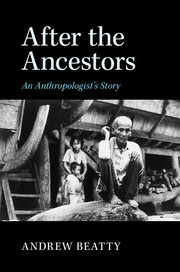Book contents
- Frontmatter
- Epigraph
- Contents
- List of illustrations
- Preface
- People
- Map
- Prologue
- 1 The statue
- 2 House key
- 3 Among women
- 4 Blood brothers
- 5 Daggers and debutants
- 6 Stormy Sunday
- 7 Three things that matter
- 8 The making of great men
- 9 A game of chess
- 10 Cholera song
- 11 Progress
- 12 Brothers and strangers
- 13 Exile and return
- 14 Field work
- 15 The chicken's neck
- 16 Good deaths and bad deaths
- 17 First family
- 18 Blessing
- 19 Half an egg
- 20 Waiting
- 21 Death of a chief
- 22 Ama Jonah at bay
- 23 Unravelling
- 24 The ethnographer and his double
- Epilogue
- Index
5 - Daggers and debutants
Published online by Cambridge University Press: 05 March 2015
- Frontmatter
- Epigraph
- Contents
- List of illustrations
- Preface
- People
- Map
- Prologue
- 1 The statue
- 2 House key
- 3 Among women
- 4 Blood brothers
- 5 Daggers and debutants
- 6 Stormy Sunday
- 7 Three things that matter
- 8 The making of great men
- 9 A game of chess
- 10 Cholera song
- 11 Progress
- 12 Brothers and strangers
- 13 Exile and return
- 14 Field work
- 15 The chicken's neck
- 16 Good deaths and bad deaths
- 17 First family
- 18 Blessing
- 19 Half an egg
- 20 Waiting
- 21 Death of a chief
- 22 Ama Jonah at bay
- 23 Unravelling
- 24 The ethnographer and his double
- Epilogue
- Index
Summary
“You must kill pigs if you want to be counted,” said Ama Darius. “Two or three would do as a start; no one expects an owasa – even I haven't given a proper owasa yet – but it puts you on the right path.”
By repetition and insinuation, his suggestion turned into a definite plan, and on New Year's Eve in 1986, after four months in the village, the plan very suddenly came to fruition.
What did it mean to be counted? A man who has fed the village is known as a Pig Stabber and bears a modest title. He has a say in village affairs, a right to be heard. There were a dozen Pig Stabbers in Orahua. The host of an owasa, a much bigger affair, receives an exalted title – Lamp of the Masses, Lord Who Nourishes the Earth – fitting the scale of the slaughter. Another dozen had achieved this status. An owasa acknowledges rank and wins influence; it is a feast of merit. But in order to stage such a feast, to assemble the resources needed to bring it off, the host must already have attained a good deal of influence: the boastful title, the acclaim, the gory theatre of the kill, are a proof of his worth. The much-decorated chief of Orahua had given six owasas, the last of which involved the massacre of hundreds of pigs in a week-long orgy of killing, gorging, speech-making and dancing. By a formula peculiar to certain tribal societies – from the Kwakiutl of British Columbia to the hills of Nagaland – in feasts of merit, rank is attained not by the accumulation of wealth, but by its destruction. The greatest man is the one who can suffer the greatest loss.
Set beside these epic feats, our debut was puny, far below what was required even of a Pig Stabber. But it had the merit of being gratuitous, something unprecedented in Niha custom, for in feasting as in life, every pound of flesh must be reckoned; nothing is done for nothing.
- Type
- Chapter
- Information
- After the AncestorsAn Anthropologist's Story, pp. 68 - 88Publisher: Cambridge University PressPrint publication year: 2015

